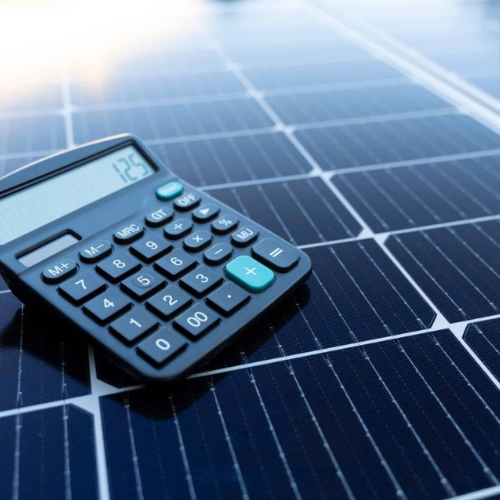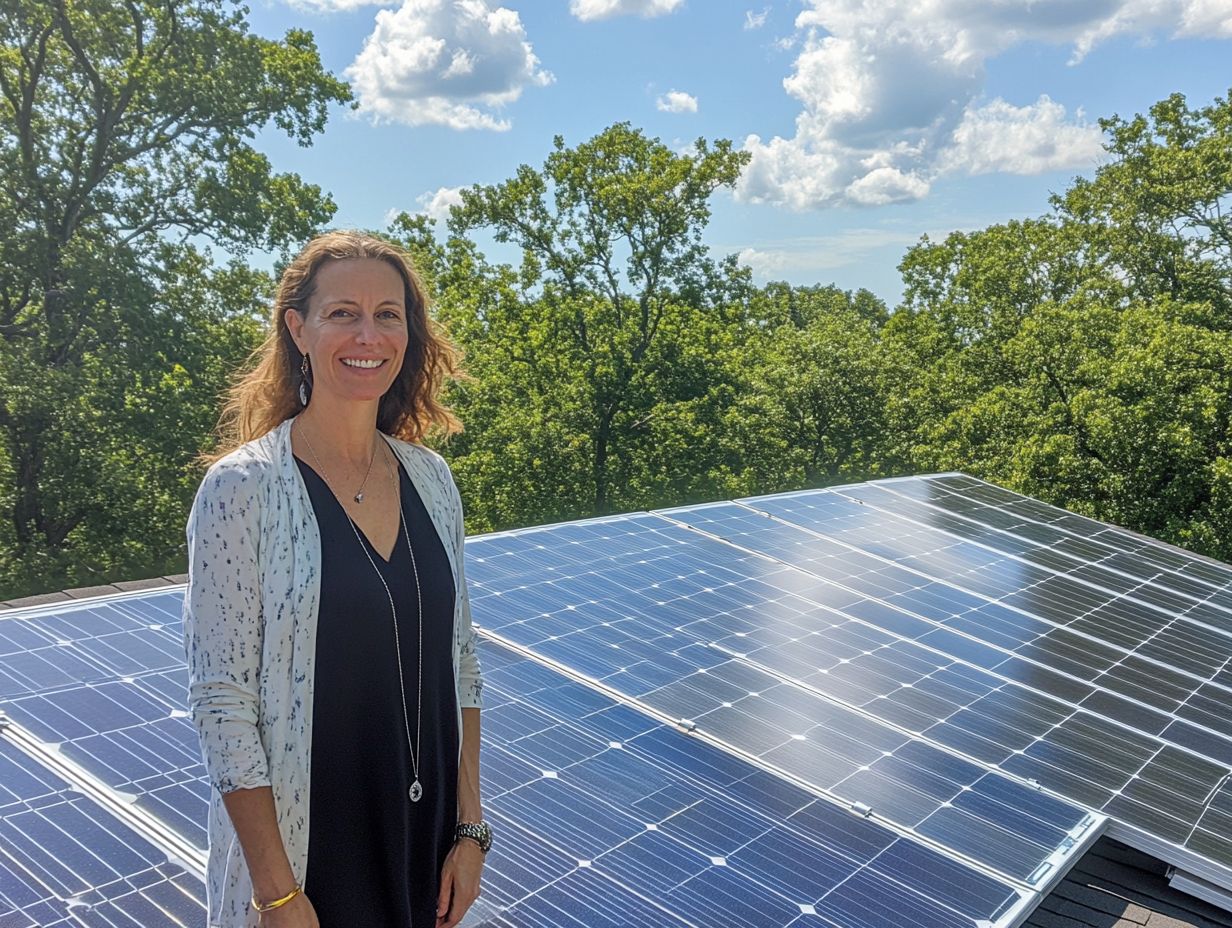Contents
- 1 Understanding Solar Contracts
- 2 Key Terms and Conditions to Consider
- 3 What to Expect During the Installation Process
- 4 Effective Maintenance and Monitoring of Your Solar System
- 5 Identifying and Mitigating Potential Risks
- 6 Essential Legal Considerations for Solar Contracts
- 7 Frequently Asked Questions
- 7.1 Common Questions About Solar Contracts
- 7.2 Can I Negotiate the Terms and Conditions in a Solar Contract?
- 7.3 What Payment Options Are Typically Included in a Solar Contract?
- 7.4 What Warranties Should I Expect in a Solar Contract?
- 7.5 What Happens If There Are Issues With My Solar System?
- 7.6 Can I Cancel My Solar Contract?
As solar energy becomes a popular choice for homeowners, it is essential for homeowners to understand the ins and outs of solar contracts and the related terms and conditions to make informed decisions.
This article breaks down everything you need to know, from what a solar contract actually entails to the key terms and conditions that could impact your investment, including financing options and service agreements.
You’ll explore payment options, warranties, the installation process, maintenance requirements, potential risks, and your legal rights.
By the end, you’ll be ready to navigate solar contracts with confidence, understanding your legal obligations and rights.
Understanding Solar Contracts
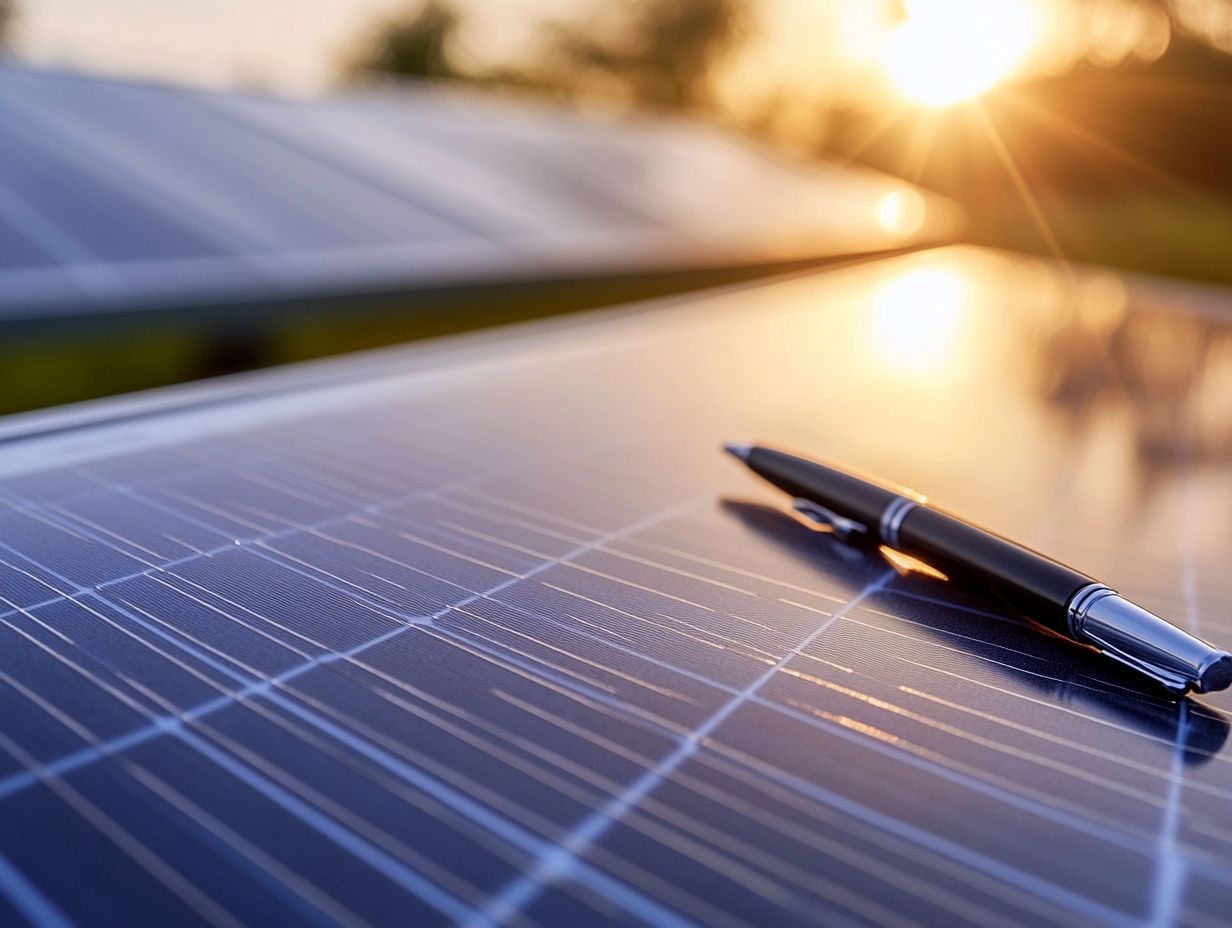
Understanding solar contracts is essential for homeowners considering solar energy systems. These agreements lay out your expectations, financial obligations, and legal rights when it comes to installing and maintaining solar panels, including contract duration and cancellation policy.
A typical solar contract will cover important details like payment schedules, the duration of the contract, warranties, performance guarantees, and compliance with local regulations, so you know exactly what to expect throughout the process.
Plus, it highlights incentives like tax credits, rebates, and other solar incentives that can really influence your overall costs and savings when you switch to renewable energy.
What is a Solar Contract?
A solar contract is basically your playbook with the solar provider, laying out all the terms and conditions for installing and maintaining your solar energy system.
This document covers your financial obligations, like payment terms, service agreements, and any warranties that come with the solar panels and installation services.
Getting a grip on the details of a solar contract is very important for you as a consumer. It protects your investment, outlines your rights and responsibilities, and keeps things clear between you and the service provider.
You’ll find it typically outlines the responsibilities of both parties during installation, expected timelines, installation standards, and what to expect for system maintenance and repairs.
By having a solid contract in place, you can reduce potential risks and avoid misunderstandings down the line.
This ensures a smoother transition to renewable energy, compliance with policies, and the potential for significant long-term savings on your energy bills.
U.S. Department of Energy (DOE). (2020). A Guide to Community Solar: Utility, Private, and Non-profit Project Development. Link
Key Terms and Conditions to Consider
When you’re reviewing a solar contract, it’s very important to pay close attention to the key terms and conditions. These details will determine your financial obligations, consumer rights, and vendor obligations during the entire agreement.
You’ll want to look out for important elements like payment terms, warranty coverage, cancellation policies, and performance guarantees.
These factors can really impact both your investment and how well your solar energy system performs, including operational performance.
Understanding these terms is crucial for making sure the installation process goes smoothly and for protecting your interests, ensuring compliance with installation standards.
Payment and Financing Options Available
Understanding the payment and financing options in your solar contract is very important because these details will shape your overall investment and financial obligations related to your solar energy system.
You might find various financing structures in contracts, like cash payments, leasing options, and power purchase agreements (PPAs).
There are also available incentives, such as tax credits, rebates, and renewable credits, that can make going solar a lot more affordable.
Exploring what each option means can really help you make informed financial decisions.
For example, while a cash payment might hit your wallet hard at first, it usually leads to bigger long-term savings through lower electricity bills and possibly even a boost in your property value, contributing to energy independence.
On the flip side, leases and PPAs can keep your initial costs down, but they may limit the financial perks of ownership, such as tax incentives and potential energy savings.
It’s crucial to get your head around these dynamics, especially since many states offer additional incentives that can further reduce costs, making solar systems more accessible and contributing to a sustainable energy future.
Equipment and Installation
The equipment and installation section of your solar contract breaks down the details of the solar panels and other components, including equipment specifications, that will make up your renewable energy system.
It is important to know the quality, transparent pricing, and detailed specifications you are receiving.
This part also covers important information on installation standards, procedures, and compliance, which are key to ensuring everything runs smoothly and safely during the setup.
When you stick to these specifications, it facilitates a seamless integration of all components, helping to maximize their efficiency and lifespan.
Plus, understanding the installation procedures not only keeps you in line with industry standards but also cuts down on the chances of errors that could lead to system failures, inefficiencies, or penalties.
When every piece of equipment meets the outlined criteria, you can feel confident that your investment will deliver the expected energy savings and environmental benefits, ultimately boosting the overall reliability of your solar energy system.
Understanding Warranties and Guarantees
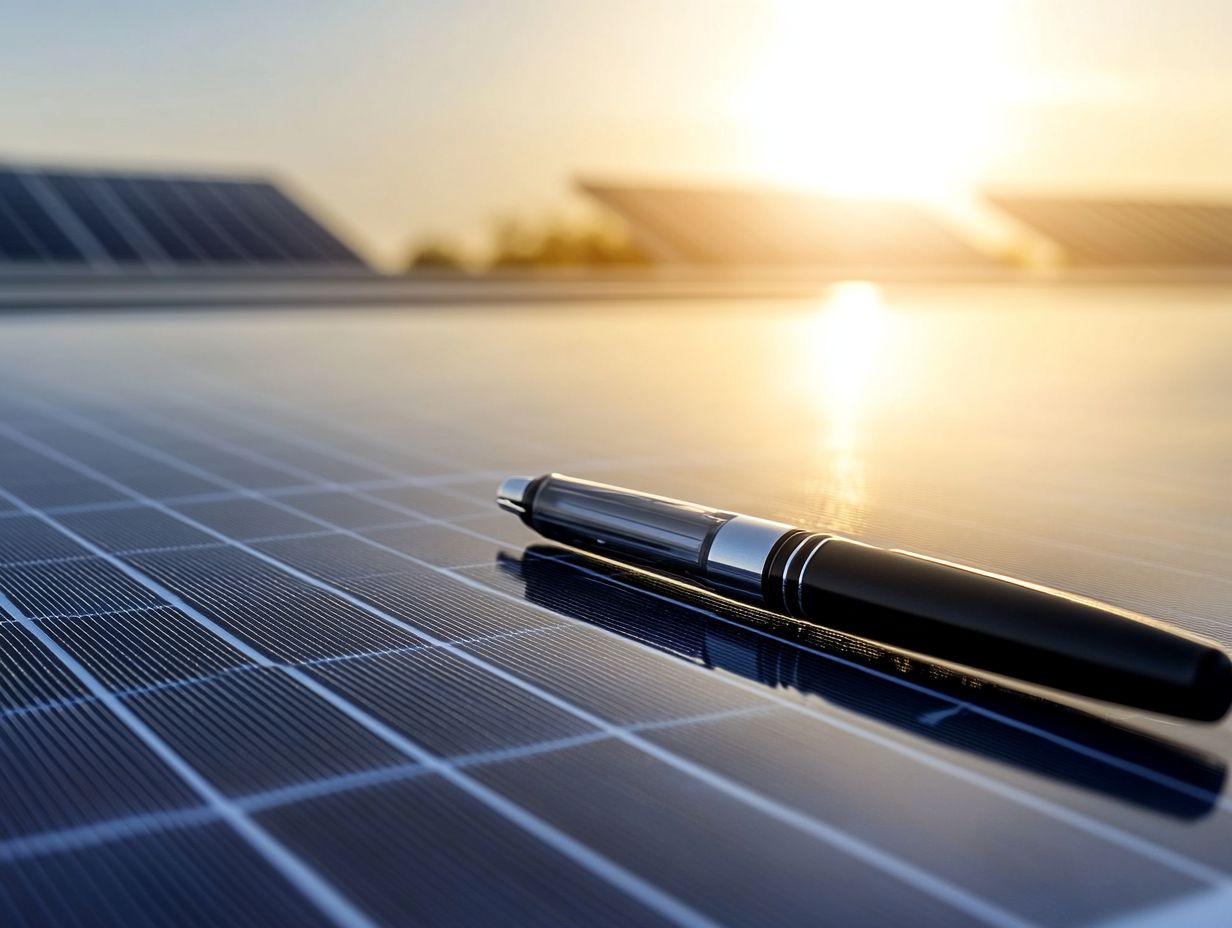
Warranties and guarantees are crucial parts of your solar contract because they give you peace of mind about the longevity and performance of your solar energy system.
These terms lay out the warranty coverage for both the solar panels and the installation services, making sure you’re protected against any potential defects or performance hiccups for the duration agreed upon.
It is essential to understand the different types of warranties available to make an informed decision. Usually, there are product warranties that cover the physical integrity of the solar panels, often lasting anywhere from 10 to 25 years.
Then, you have performance warranties that promise your system will produce a certain level of power efficiency throughout its lifespan.
Don’t forget about installation warranties! They cover the workmanship of your solar installation, protecting you from any installation-related issues that might pop up.
Recognizing the importance of these assurances not only safeguards your consumer protections but also boosts your satisfaction with the entire solar experience, giving you the confidence that your investment is protected for years to come.
What to Expect During the Installation Process
During the installation of your solar energy system, you can expect to follow a clear installation timeline and achieve various project milestones that keep everything on track and running smoothly.
You’ll start with a thorough site assessment to ensure compliance with local regulations, making sure everything’s set up right. Then, you’ll need to get the necessary electrical permits, which is essential in the process.
Finally, there’s the exciting grid connection, which is crucial for maximizing those energy production estimates and overall system performance, contributing to enhanced energy efficiency once your solar panels are up and running.
Timeline and Potential Delays
The timeline for installing your solar energy system can vary based on a bunch of factors, like project milestones, equipment availability, and any potential delays or unforeseen circumstances that might pop up along the way.
Understanding these elements can help you set realistic expectations for project delivery and how long the installation will take, and establish a plan for monitoring your energy once your system is up and running.
Things like local permitting processes, weather conditions, and the skill level of your installation team can have a big impact on how long the project takes.
For example, if there are delays in getting the necessary permits, consent, or approvals from local authorities, it could push back your start date.
And let’s not forget about unforeseen issues like equipment shortages or bad weather that could slow things down. That’s why having an effective energy monitoring system in place is key.
It not only helps optimize your energy production but also ensures the project stays on track, making it easier to tackle any unexpected bumps in the road.
Effective Maintenance and Monitoring of Your Solar System
Once you have your solar energy system installed, it’s crucial for you to maintain and monitor its performance to ensure optimal energy production, system performance, and longevity.
By keeping up with regular maintenance and effective energy monitoring systems, you can track performance metrics and ensure your system operates efficiently.
Plus, this helps you stay in line with the warranty coverage laid out in your solar contract.
Regular Maintenance and Monitoring Requirements
Regular maintenance and performance monitoring are critical to keep your solar energy system running smoothly for as long as possible. You’ll usually find specific requirements in your warranty coverage that you’ll want to pay attention to.
Establish a routine to conduct routine inspections, clean your solar panels to get rid of dirt and debris, and check for any shading from nearby trees, ensuring compliance with warranty coverage. These simple actions can really help extend your system’s lifespan.
Watch your inverter performance and track energy output with monitoring systems to ensure compliance with operational performance standards. This way, you can spot any discrepancies that might signal underlying issues.
By regularly reviewing these performance metrics, you can tackle minor problems before they turn into costly repairs, ensuring that your solar setup continues to provide clean energy efficiently for years to come, enhancing energy efficiency.
Before we discuss potential risks, it’s important to understand the context in which they arise.
Identifying and Mitigating Potential Risks
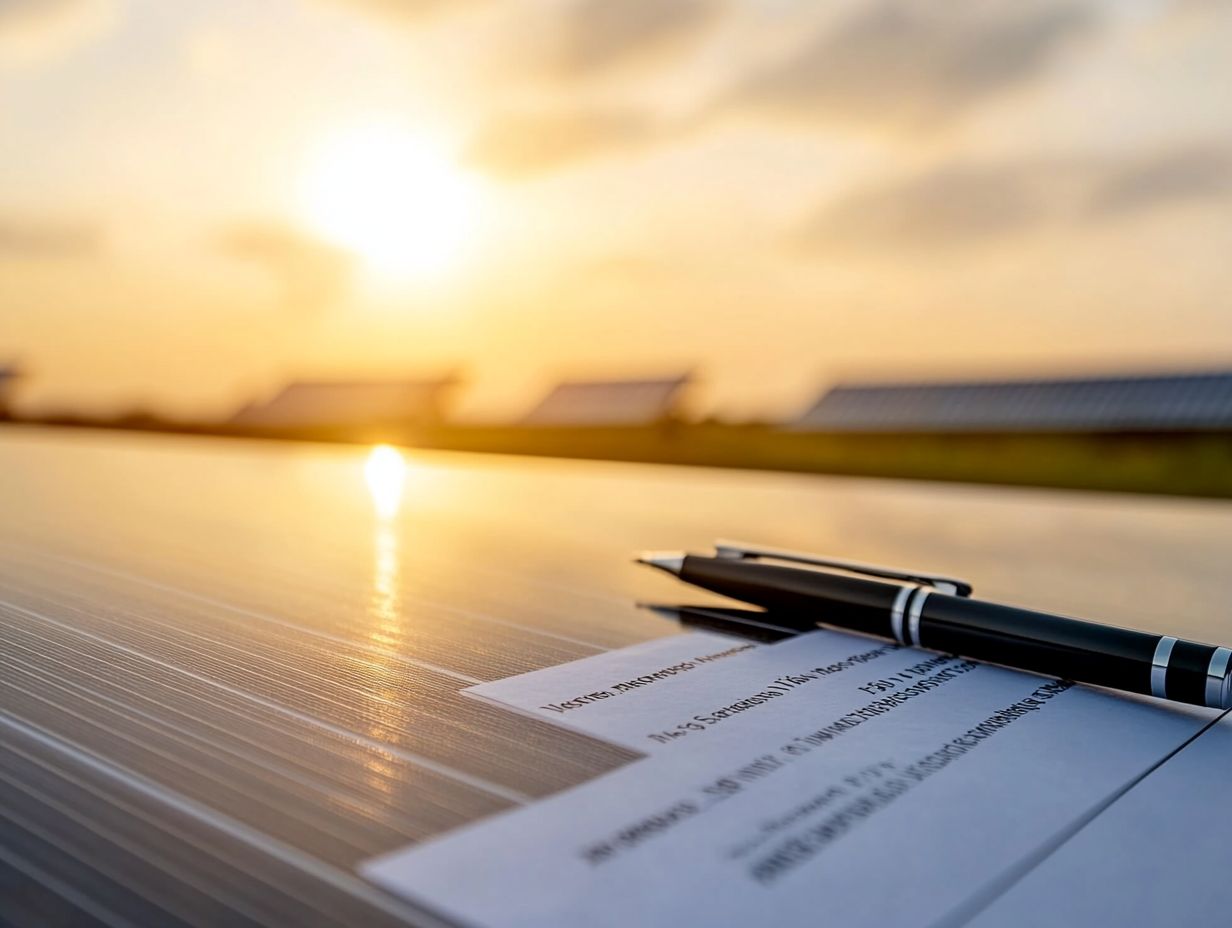
When you engage with solar energy systems, there are some risks you should keep in mind, like potential liability, insurance requirements, and challenges that might pop up during installation and service.
By addressing these risks through careful planning, sticking to safety standards, and having a clear dispute resolution or arbitration process set up, you can protect your investment and make your transition to renewable energy as smooth as possible.
Potential Risks and How to Mitigate Them
Understanding the potential risks associated with your solar energy system, like liability concerns, installation-related issues, and compliance with local regulations, is crucial for protecting your investment.
You need to be aware that accidents can happen during the installation process, or there might be damage to third-party property, which could lead to some pretty expensive legal headaches.
Additionally, ensuring proper insurance coverage and understanding vendor obligations can mitigate these risks.
To navigate these challenges, it’s very important to choose a reputable installer who can show proof of their insurance coverage and comply with installation standards.
Securing liability insurance to cover any unexpected incidents can give you invaluable peace of mind.
Taking proactive steps in risk management should also involve a thorough review of your solar contract. This ensures that it clearly addresses responsibilities, warranties, and installation standards, which helps reduce the chances of disputes popping up down the road.
Essential Legal Considerations for Solar Contracts
When you’re entering a solar contract, it’s very important to grasp the legal considerations that come with it, including your consumer rights, governing laws, and potential incentives or rebates in your area.
Having thorough documentation is key to making sure everything’s in line with regulations, transparent pricing, and protecting your interests. So, take the time to review these details closely before you put pen to paper on any contract.
U.S. Department of Energy (DOE). (2022). Solar Energy Technologies Office: FAQs. Link
Your Rights and Responsibilities in Solar Contracts
As a homeowner stepping into a solar contract, it’s very important for you to understand your rights and responsibilities, as well as your legal obligations. This knowledge will help you have a smooth experience and protect your investment.
Familiarizing yourself with your legal obligations, such as contract duration, how long the contract lasts, and what performance you can expect, enables you to make informed decisions about your solar energy system.
You’ll want to pay attention to the specific terms about maintenance, warranty coverage, and cancellation policies. It’s essential to know that you’re entitled to timely repairs, regular service checks, and monitoring systems, which should be clearly laid out in the contract.
Understanding these obligations ensures efficient system operation, but also ensures you’re in line with regulatory standards.
Being clear on your financial responsibilities, like payment schedules, escalation clauses, and any penalties for late payments, gives you the tools you need to navigate your solar contract like a pro.
This will ultimately boost your satisfaction, energy savings, and return on your investment.
Frequently Asked Questions
Common Questions About Solar Contracts
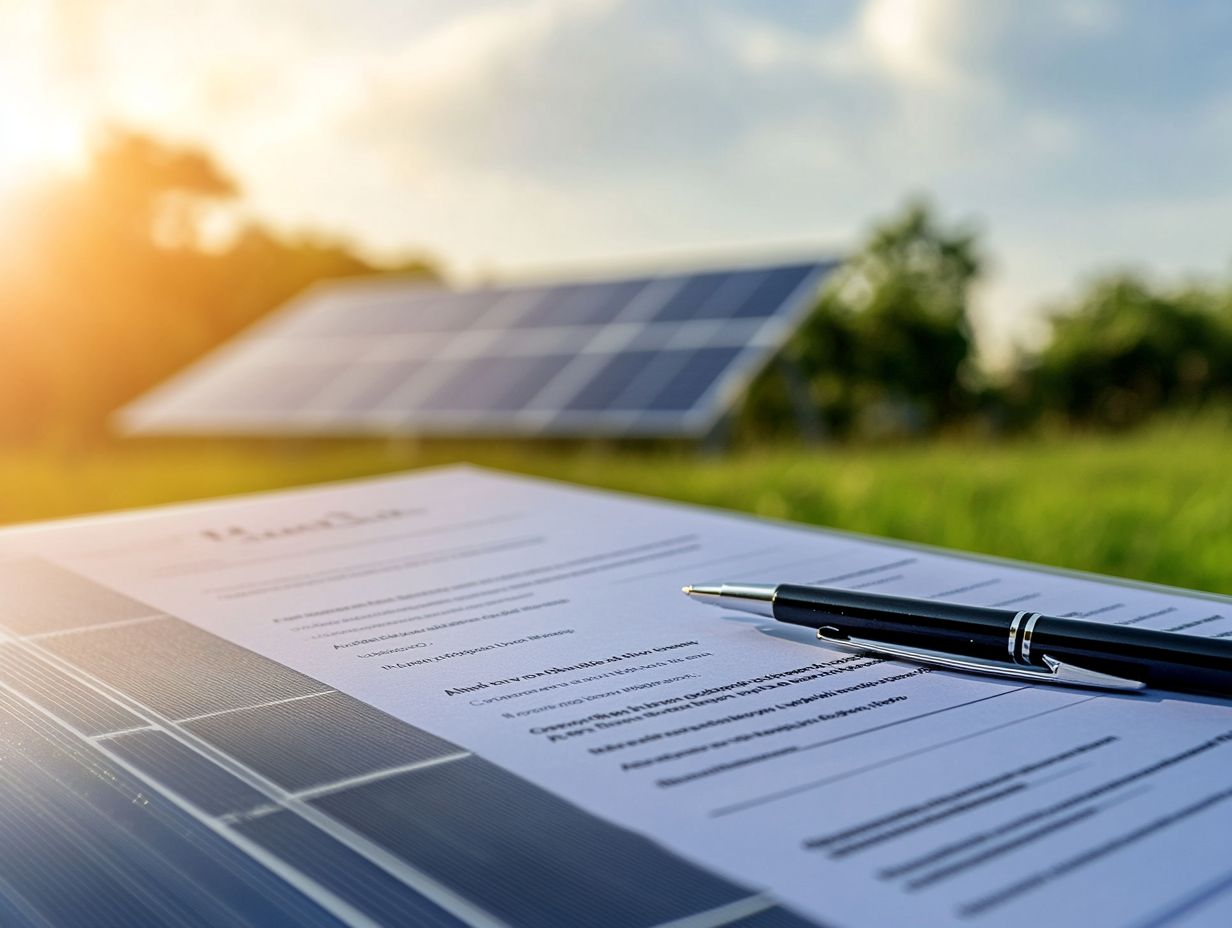
What Should You Know About Solar Contract Terms and Conditions?
The terms and conditions within a solar contract outline the agreement between you and your solar provider. They include details about payment terms, warranties, system performance, energy production, and more.
Can I Negotiate the Terms and Conditions in a Solar Contract?
Yes, you can negotiate certain terms and conditions in a solar contract. It is essential to carefully review the contract, consider any amendments, and discuss any concerns or changes with your provider before signing.
What Payment Options Are Typically Included in a Solar Contract?
Payment options may vary; however, they often include upfront payments, financing structures, or a Power Purchase Agreement (PPA). Make sure to understand the payment terms and choose the option that best fits your needs.
What Warranties Should I Expect in a Solar Contract?
Solar contracts typically include warranties for the panels, inverter, and installation work. It is important to review these warranties and service provisions to ensure they provide sufficient coverage for your system.
What Happens If There Are Issues With My Solar System?
Most solar contracts include a section that outlines the process for addressing any issues with the system. This may include contacting the provider for repairs or replacements, utilizing performance guarantees, and potentially seeking compensation if the system does not meet performance expectations.
Can I Cancel My Solar Contract?
Yes, you can cancel your solar contract; however, there may be penalties or fees involved. Make sure to carefully review the cancellation policy, termination rights, and understand the potential costs associated with cancelling the contract.


